latest updated documents, correct, verified & graded A study materials
get bundles, documents, test banks, case studies, shadow health's, ATIs, HESIs, study guides, summary, assignments & every kind of study materials.
- 15500
- 0
- 1116
Community
- Seguidores
- Siguiendo
727 Comentarios recibidos
16660 artículos
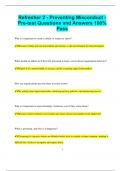
SafeSport Bundled Exams Questions and Answers Latest Versions (2025/2026) (Complete and Accurate)
SafeSport Bundled Exams Questions and Answers Latest Versions (2025/2026) (Complete and Accurate)
- Lote
- • 6 artículos •
- Refresher 2 - Preventing Misconduct - Pre-test Questions and Answers 100% Pass • Examen
- SafeSport Refresher 1: Recognizing and Reporting Misconduct Questions and Answers Latest Update 100% Pass • Examen
- SafeSport Refresher 2: Preventing Misconduct Questions and Answers Already Passed • Examen
- SafeSport Questions and Answers with Complete Solutions • Examen
- SafeSport Questions and Answers Latest Version Graded A+ • Examen
- Y mas...
SafeSport Bundled Exams Questions and Answers Latest Versions (2025/2026) (Complete and Accurate)

STD Bundled Exams Questions and Answers Multiple Versions Latest Updates (2024/2025) (Complete and Accurate)
STD Bundled Exams Questions and Answers Multiple Versions Latest Updates (2024/2025) (Complete and Accurate)
- Lote
- • 15 artículos •
- STD Nclex Practice Questions and Answers Latest Version with Verified Solutions • Examen
- STD's Questions and Answers Latest Version Graded A+ • Examen
- HESI Case Study: Sexually Transmitted Diseases (STD's) Questions and Answers Latest Version Graded A+ • Examen
- STDs Questions and Answers Latest Update 100% Pass • Examen
- STD: Chlamydia, Gonorrhea, and Herpes Questions and Answers Latest Version Graded A+ • Examen
- Y mas...
STD Bundled Exams Questions and Answers Multiple Versions Latest Updates (2024/2025) (Complete and Accurate)

Sexually Transmitted Diseases Bundled Exams Questions and Answers Multiple Versions Latest Updates (2025/2026) (Complete, Accurate, and Verified)
Sexually Transmitted Diseases Bundled Exams Questions and Answers Multiple Versions Latest Updates (2025/2026) (Complete, Accurate, and Verified)
- Lote
- • 28 artículos •
- STI Questions and Answers Latest Version Already Passed • Examen
- Sexually Transmitted Diseases Questions and Answers Latest Version Already Passed • Examen
- Risks of Sexually Transmitted Infections Questions and Answers Already Passed • Examen
- EAQ Sexually Transmitted Infections Questions and Answers Latest Version 100% Pass • Examen
- HESI Case Study: Sexually Transmitted Diseases (STD's) Questions and Answers Latest Version Graded A+ • Examen
- Y mas...
Sexually Transmitted Diseases Bundled Exams Questions and Answers Multiple Versions Latest Updates (2025/2026) (Complete, Accurate, and Verified)
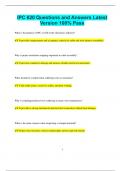
IPC Bundled Exams Questions and Answers Latest Versions (2025/2026) (Complete and Accurate)
IPC Bundled Exams Questions and Answers Latest Versions (2025/2026) (Complete and Accurate)
- Lote
- • 7 artículos •
- IPC 620 Questions and Answers Latest Version 100% Pass • Examen
- A-IPC Questions and Answers Latest Version 100% Pass • Examen
- IPC A 610 Questions and Answers Latest Version Already Passed • Examen
- IPC Final Exam Questions and Answers Latest Version Already Passed • Examen
- EE569 IPC Test Questions and Answers Latest Version Graded A+ • Examen
- Y mas...
IPC Bundled Exams Questions and Answers Latest Versions (2025/2026) (Complete and Accurate)
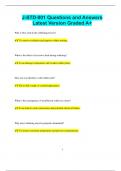
J-STD Bundled Exams Questions and Answers Latest Versions (2025/2026) (Complete and Accurate)
J-STD Bundled Exams Questions and Answers Latest Versions (2025/2026) (Complete and Accurate)
- Lote
- • 4 artículos •
J-STD Bundled Exams Questions and Answers Latest Versions (2025/2026) (Complete and Accurate)

Medical Gas Bundled Exams Questions and Answers Multiple Versions Latest Updates (2025/2026) (Complete, Accurate, and Verfied)
Medical Gas Bundled Exams Questions and Answers Multiple Versions Latest Updates (2025/2026) (Complete, Accurate, and Verfied)
- Lote
- • 20 artículos •
- MED GAS QUESTIONS AND ANSWERS ALREADY PASSED • Examen
- Storage and Delivery of Medical Gases 1 Questions and Answers Already Passed • Examen
- Medical Gas 6010 Installers Practice Test Questions and Answers 100% Pass • Examen
- Medical Gas Cylinders Latest Update Rated A+ • Examen
- Medical Gases Latest Update with Verified Solutions • Examen
- Y mas...
Medical Gas Bundled Exams Questions and Answers Multiple Versions Latest Updates (2025/2026) (Complete, Accurate, and Verfied)
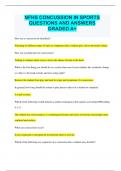
Concussion Bundled Exams Questions and Answers Multiple Versions Latest Updates (2025/2026) (Complete and Accurate)
Concussion Bundled Exams Questions and Answers Multiple Versions Latest Updates (2025/2026) (Complete and Accurate)
- Lote
- • 14 artículos •
- NFHS CONCUSSION IN SPORTS QUESTIONS AND ANSWERS GRADED A+ • Examen
- Concussion for Students Test NFHS Questions and Answers Graded A+ • Examen
- Concussion Questions and Answers Latest Update Already Passed • Examen
- Concussion Training for Medical Personnel Questions and Answers Latest Version Graded A+ • Examen
- Heads Up Concussion Training Questions and Answers Latest Version 100% Verified • Examen
- Y mas...
Concussion Bundled Exams Questions and Answers Multiple Versions Latest Updates (2025/2026) (Complete and Accurate)

STD Quiz Latest Update with Verified Answers
STD Quiz Latest Update with Verified Answers Which STD can cause pelvic inflammatory disease in women if left untreated? Chlamydia What is one possible complication of untreated gonorrhea in men? Inflammation of the testicles. Which STD remains in the body for life even after symptoms disappear? Herpes What is the best way to confirm an STD diagnosis? Getting tested by a healthcare provider. Which STD has flu-like symptoms during its early stages? HIV 2 What is on...
- Package deal
- Examen
- • 23 páginas •
STD Quiz Latest Update with Verified Answers Which STD can cause pelvic inflammatory disease in women if left untreated? Chlamydia What is one possible complication of untreated gonorrhea in men? Inflammation of the testicles. Which STD remains in the body for life even after symptoms disappear? Herpes What is the best way to confirm an STD diagnosis? Getting tested by a healthcare provider. Which STD has flu-like symptoms during its early stages? HIV 2 What is on...
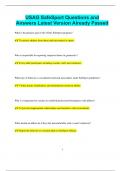
USAG SafeSport Questions and Answers Latest Version Already Passed
USAG SafeSport Questions and Answers Latest Version Already Passed What is the primary goal of the USAG SafeSport program? To protect athletes from abuse and misconduct in sports. Who is responsible for reporting suspected abuse in gymnastics? Every adult participant, including coaches, staff, and volunteers. What type of behavior is considered emotional misconduct under SafeSport guidelines? Verbal attacks, humiliation, and intimidation toward an athlete. Why is it important ...
- Package deal
- Examen
- • 9 páginas •
USAG SafeSport Questions and Answers Latest Version Already Passed What is the primary goal of the USAG SafeSport program? To protect athletes from abuse and misconduct in sports. Who is responsible for reporting suspected abuse in gymnastics? Every adult participant, including coaches, staff, and volunteers. What type of behavior is considered emotional misconduct under SafeSport guidelines? Verbal attacks, humiliation, and intimidation toward an athlete. Why is it important ...
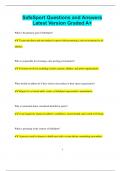
SafeSport Questions and Answers Latest Version Graded A+
SafeSport Questions and Answers Latest Version Graded A+ What is the primary goal of SafeSport? To prevent abuse and misconduct in sports while promoting a safe environment for all athletes. Who is responsible for ensuring a safe sporting environment? Everyone involved, including coaches, parents, athletes, and sports organizations. What should an athlete do if they witness misconduct in their sports organization? Report it to a trusted adult, coach, or SafeSport representativ...
- Package deal
- Examen
- • 9 páginas •
SafeSport Questions and Answers Latest Version Graded A+ What is the primary goal of SafeSport? To prevent abuse and misconduct in sports while promoting a safe environment for all athletes. Who is responsible for ensuring a safe sporting environment? Everyone involved, including coaches, parents, athletes, and sports organizations. What should an athlete do if they witness misconduct in their sports organization? Report it to a trusted adult, coach, or SafeSport representativ...

Guam Drivers Written Exam Study Guide (2022/2023) 100% Pass
MGT 300 EXAM 2 LATEST VERSION 100% SOLVED
Sonosim Mastery Test-Hip Questions and Answers Already Passed
PTCB - DEA Forms (2022/2023) 100% Verified
HAZWOPER 40 - Final Exam Questions and Answers (2022/2023) (Passed with 100%)